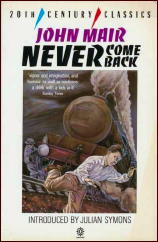Mon 28 Apr 2014
Reviewed by Dan Stumpf: JOHN MAIR – Never Come Back.
Posted by Steve under Authors , Reviews[4] Comments
JOHN MAIR – Never Come Back. Victor Gollanz Ltd., UK, hardcover, 1941. Little Brown & Co., US, hardcover, 1941. Oxford University Press, US, softcover, October 1986. Film: Tempean, 1955, as Tiger by the Tail; released in the US as Cross-Up.

I want to preface this review by saying that I have long suspected that there is no vast, secret conspiracy to weaken our nation, rule the world, or put mind-control drugs in our morning coffee. There may be a litany of irritating little organizations with these ends in sight, but no vast secret one.
That’s what I suspect, anyway, and there’s a good reason why I know there isn’t any Giant Conspiracy secretly running our lives: If the Army taught me anything at all, it’s that the bigger the organization, the more the entropy — as Edward Snowden, Private Manning and Major Nidal have so clearly/tragically demonstrated. And I recently found my anti-paranoid suspicions pleasantly realized in this old book.
I first heard about John Mair’s Never Come Back from a passing reference in (where else?) a reference book. Intrigued, I found a copy (and isn’t the internet a wondrous boon to curious readers?) and proceeded to enjoy a thriller like no other.
Subsequent research has led me to discover that all the best things about it have already been written, but I’ll recap my thoughts here anyway, as this is a book that deserves notice, particularly for fans of John Buchan.
The central character, Desmond Thane, starts out as a hack-writer for a syndicate, making up human interest articles that are sold to newspapers as filler. He quickly finds himself in Richard Hannay territory though, after leaving the apartment (or flat, if you must) of a murdered woman who turns out to have been involved with one of those Shadowy International Organizations that seem to have been rife in England between the wars. As one might expect, he’s soon in possession of the usual MacGuffin, suspected of the murder, and on the run from the SIO.
But there are some telling differences here: Thane actually is guilty of the lady’s murder, and he commits another in the course of the narrative. He’s a writer, With a literary approach to intrigue, and also something of a smart-ass. While dodging bullets and brutes, he tends to view his plight with a jaded philosophical detachment:
That’s the attitude we get from Thane as Mair trots him through the usual paces of the genre with style and speed. We get kidnappings by various and sundry bad guys, narrow escapes, cross-country chases, phony cops, seductions, a criminal mastermind with dreams of global conquest… I could go on, but if you’ve read much of this sort of thing, you pretty much know what to expect.
The difference here is Thane’s attitude and Mair’s canny view of the whole genre — not quite spoof but definitely dubious. The Sinister International Organization turns out to be rather bureaucratic and inefficient, Thane resists torture only because he doesn’t know what the hell the bad guys are after, and when he finds out how valuable it is, his first thought is to sell it back to them and retire in comfort.
There are about a dozen pages of misplaced whimsy while he fakes amnesia, but things soon get right back on the sardonic track; It seems that the Chairman of the SIO board (and would-be Ruler of the World) has written a book and Thane, like any curious man of letters, feels compelled to read it. Which leads to a scene so unexpected and screamingly funny and perfectly Right that I won’t spoil it for you — check it out.
Biographical Note: This was the author’s one and only novel. He died in 1942 in a training flight accident as a pilot for the RAF. The book has been reviewed elsewhere on the Internet by author Martin Edwards on his blog. Check it out here.
April 29th, 2014 at 2:50 pm
This is a great book and a canny dissection of the Buchan style hero and thriller.
By all means read the edition shown with Julian Symons fine piece on the author and the book.
But anyone who has ever read Buchan, or Ambler and Greene, should read this often funny, sometimes shocking, sardonic novel that is also a first class thriller.
Like Dan, my experience with conspiracy is that it mostly stumbles onto success and usually comes undone with much public attention.
Conspiracies can last for sometime though. From the thirties on Interpol was a Nazi front organization and continued as that well into the 1960’s helping Nazi war criminals to elude justice and refusing to supply information on them claiming that was ‘political.’
It’s long since been reformed but despite movies and television it has no enforcement capabilities and has only had investigative power since the nineties.
Like most conspiracies it collapsed of its own weight.
April 30th, 2014 at 9:45 am
I have a copy of this book which is introduced by Julian Symons. When I began to read this novel I was surprised by the cynical tone of the narrative. Very unusual.
April 30th, 2014 at 2:44 pm
I should have mentioned, this was adapted as a two part miniseries shown on A&E and a fairly well done adaptation that didn’t lose any of the novels edge.
September 3rd, 2014 at 11:52 am
I just finished this book and liked it. Mind you, the intro by Julian Symons helped liking it (reading that Orwell had read it, too).
It does feel like a first novel, and by a young man, but I especially like his little rant towards the end about Knowledge NOT being Power.